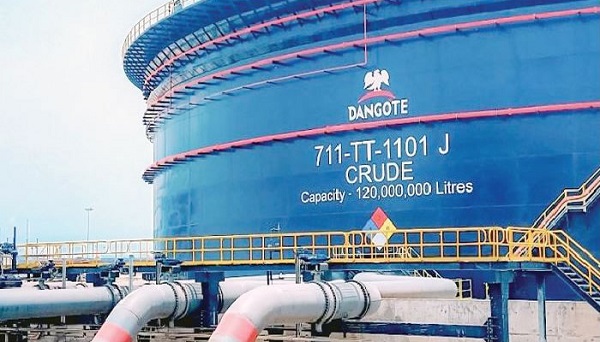Experts in Nigeria’s oil and gas sector have offered cautious assessments of the newly launched Dangote Refinery, noting both its promise and early challenges.
At an industry event, Dr. Chijioke Ekechukwu, Managing Director of Dignity Finance & Investment Ltd, said the refinery’s output could influence economic forecasts for 2024 and 2025. He added that relying more on local crude could ease pressure on foreign exchange reserves and support job growth.
The $19 billion refinery, with a planned capacity of 650,000 barrels per day, began limited operations this year and is expected to become Africa’s largest if it reaches full capacity. It could also help reduce Nigeria’s dependence on imported fuel.
However, securing adequate domestic crude has been difficult, prompting imports from the U.S. and Brazil. Uncertainties around pricing, regulation, and the refinery’s dealings with the Nigerian National Petroleum Company Limited (NNPCL) also remain.
Energy sector financial analyst, Abdulai Omosunlade noted that infrastructure alone will not resolve Nigeria’s energy challenges.
“Local refining offers benefits like foreign exchange conservation and supply security,” he said. “But the long-term success depends on transparent pricing, regulatory oversight, and strong institutional controls to prevent market distortions. Without these, capacity alone will not solve the underlying issues.”
The refinery’s pricing dispute with petroleum marketers in late 2024 underscored concerns about governance and market regulation.
At the same time, international oil companies, including Shell, ExxonMobil, and Eni, have accelerated divestment from Nigeria’s onshore and shallow-water assets. Between 2020 and 2024, these companies sold billions of dollars’ worth of assets to indigenous operators such as Seplat Energy and Oando. While this increases local participation, it also presents operational challenges, including managing aging infrastructure, security risks, environmental responsibilities, and community relations.
Dr. Ayodele Oni, legal adviser to the Nigerian Electricity Regulatory Commission, highlighted crude oil theft and pipeline vandalism as key obstacles affecting production and investment. “Criminal activity in the Niger Delta has reduced output and deterred foreign investment,” he said.
Omosunlade added that indigenous operators must implement international standards in governance and operations. “Owning assets is not the same as managing them effectively. Operators must ensure financial controls, safety protocols, and environmental compliance meet global standards,” he said.
Key challenges for Nigeria’s energy transition include clarifying the relationship between the Dangote Refinery, NNPCL, and independent marketers to prevent market distortions, improving security infrastructure, securing sustainable financing for asset maintenance, and ensuring policy continuity across political administrations.
Regulatory authorities, including the Nigerian Upstream Petroleum Regulatory Commission (NUPRC) and the Nigerian Midstream and Downstream Petroleum Regulatory Authority (NMDPRA), face the task of overseeing this transition while maintaining operational standards and market competition.
Nigeria’s energy sector is at a pivotal moment, while local refining and indigenous operators present opportunities to increase energy independence and economic value, success will depend on effective management, strong governance, and sustained regulatory support.

